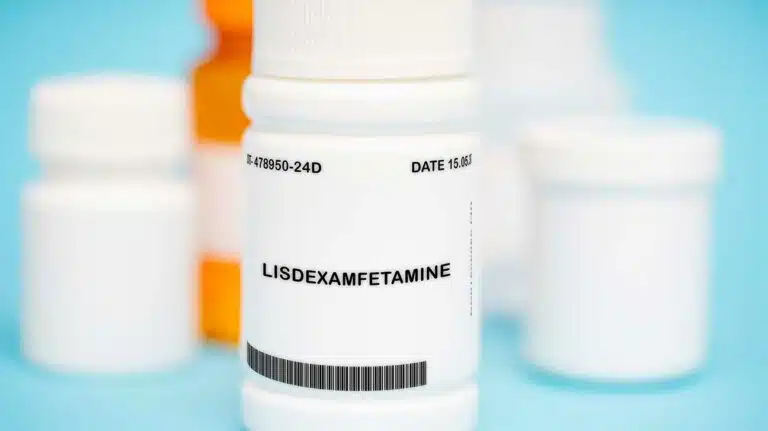Is Vyvanse A Controlled Substance?

Vyvanse (brand name for lisdexamfetamine dimesylate) is a stimulant medication classified as a Schedule II controlled substance according to the Controlled Substances Act and the United States Drug Enforcement Administration (DEA).
Vyvanse is used in the treatment of attention deficit hyperactivity disorder (ADHD) and binge eating disorder.
Vyvanse & Schedule II Stimulants
Because Vyvanse is a Schedule II controlled substance, it has a high potential for abuse and can lead to psychological or physical dependence.
Vyvanse belongs to the same Schedule II category as other stimulant drugs such as methylphenidate (Ritalin, Concerta) and dextroamphetamine-amphetamine (Adderall, Adderall XR).
Vyvanse As A Controlled Substance
As a stimulant prescription drug, Vyvanse is available as capsules, extended-release or chewable tablets. Although this medication is used for the treatment of ADHD, it can still become a habit-forming drug due to the effects it creates.
This prescription medication is a central nervous system stimulant (CNS stimulant). It works by stimulating the CNS and increasing the levels of neurotransmitters dopamine and norepinephrine in the brain. Repeatedly using the drug for its effects can lead to dependence and addiction.
Side Effects Of Vyvanse
Because of how Vyvanse works, it can help treat certain ADHD symptoms such as impulsivity, inattention, and hyperactivity. However, this ADHD medication can create a number of side effects.
Common Side Effects
According to the United States Food and Drug Administration (FDA), some of the common side effects of Vyvanse may include:
- dry mouth
- weight loss
- dizziness
- constipation
- irritability
- increased heart rate
- nausea
- trouble sleeping
- loss of appetite
Stomach pain may occur as well due to the fact that Vyvanse is a prodrug of dextroamphetamine. This is because the medication must be absorbed in the gastrointestinal tract before it becomes active. Once the active ingredients are in place, side effects may begin.
Serious Side Effects
The FDA also states a number of serious side effects can take place if Vyvanse is abused in any manner. For instance, some of the serious side effects which can take place may include:
- withdrawal symptoms
- fluctuations in blood pressure
- blurred vision
- heart attack
- psychosis
- stroke
- seizures
- coma
- Vyvanse overdose
Vyvanse Warnings & Precautions
Before taking Vyvanse, speak with your prescribing doctor to determine which dosage form is right for you and which precautions to take before starting the medicine.
Drug Interactions
A number of drug interactions can take place if certain medications are combined with Vyvanse. Serious reactions can create life-threatening health issues.
Some of the substances to avoid while taking Vyvanse include:
- supplements
- alcohol
- CNS depressants such as benzodiazepines
- other CNS stimulants
- antihistamines
- antidepressants such as monoamine oxidase inhibitors (MAOIs)
Intentionally combining any of these substances with Vyvanse is likely considered drug abuse.
Medical Conditions
Women who are pregnant or nursing should avoid Vyvanse, as there can be a risk of this medication transferring from mother to child through breast milk. Request the medical advice from your healthcare provider before taking Vyvanse while pregnant or breastfeeding.
In addition to this, those with certain heart problems or conditions may need to avoid Vyvanse due to the cardiovascular reactions which can occur due to how this prescription drug affects blood pressure and heart rate.
Those with mental illness should avoid Vyvanse before speaking with their doctor first. For instance, those with bipolar disorder should avoid Vyvanse due to the severe psychological side effects which may take place.
Dependence & Addiction
As a Schedule II controlled substance, Vyvanse has a high potential for abuse, dependence, and addiction.
If you misuse Vyvanse for a long period, you may develop a psychological or physical dependence. This means you may experience withdrawal symptoms if you abruptly stop use.
Taking more Vyvanse, or another stimulant medication, to reduce withdrawal symptoms can further the cycle of substance abuse and addiction, leading to a variety of adverse effects.
If you or a loved one struggle with prescription drug use, please contact one of our healthcare professionals today for information on our inpatient and outpatient treatment options.
Written by Ark Behavioral Health Editorial Team
©2024 Ark National Holdings, LLC. | All Rights Reserved.
This page does not provide medical advice.
Drug Enforcement Administration - Controlled Substances List
Drug Enforcement Administration - Stimulants
Food and Drug Administration - Vyvanse
National Library of Medicine: MedlinePlus - Lizdexamfetamine
Springer: CNS Drugs - A Systematic Review of the Safety of Lizdexamfetamine Dimesylate
Questions About Treatment?
Ark Behavioral Health offers 100% confidential substance abuse assessment and treatment placement tailored to your individual needs. Achieve long-term recovery.
100% confidential. We respect your privacy.
Prefer Texting?
Our friendly support team is here to chat 24/7. Opt out any time.







 Learn More
Learn More








